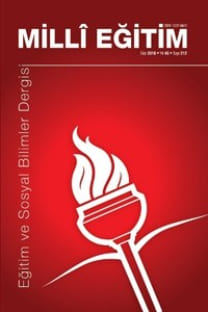BİLİŞİM TEKNOLOJİLERİ VE BİLGİSAYAR BİLİMİ: ÖĞRETİM PROGRAMI GÜNCELLEME SÜRECİ
bilgisayar bilimi, öğretim programı, programlama
___
- Allan, W., Coulter, B., Denner, J., Erickson, J., Lee, I., Malyn-Smith, J., & Martin, F. (2010). Computational Thinking for Youth. ITEST Small Working Group on Computational Thinking.
- Barr, D., Harrison, J., & Conery, L. (2011). Computational Thinking: A Digital Age. Learning & Leading with Technology, 20-23.
- Bell, T., Witten, I. H., & Fellows, M. (2015). Computer Science Unplugged. http://csunplugged.org/wp content/uploads/2015/03/CSUnplugged_OS_2015_v3.1.pdf
- Bidwell, A. (2013). Tech Companies Work to Combat Computer Science Education Gap. http://www.usnews.com/news/articles/2013/12/27/tech-companies-work-to-combat-computer-science-education-gap
- Bocconi, S., Chioccariello, A., Dettori, G., Ferrari, A., Engelhardt, K. (2016). Developing computational thinking in compulsory education – Implications for policy and practice; EUR 28295 EN; doi:10.2791/792158. http://publications.jrc.ec.europa.eu/repository/bitstream/JRC104188/jrc104188_computhinkreport.pdf
- Cortina, T. J., Dann, W. P., Frieze, C., Ciminillo, C., Tananis, C. & Trahan, K. (2012). Work in Progress:ACTIVATE: Advancing Computing and Technology Interest and innovation through teacher education. Paper presented at the Frontiers in Education Conference, Seattle, WA.
- CSTA & ISTE (2011). Computational Thinking in K–12 Education leadership toolkit. http://csta.acm.org/Curriculum/sub/CurrFiles/471.11CTLeadershiptToolkit-SP-vF.pdf.
- Daggett, W. R. (2010). Preparing students for their technological future. International Center for Leadership in Education, 1-14.
- Freudenthal, E., Ogrey, A. N., Roy, M.K. & Siegel, A. (2010). A computational introduction to STEM studies. Paper presented at the IEEE EDUCON 2010 Conference, Madrid, Spain.
- ISTE (International Society for Technology Education) (2007). ISTE Standards for Students. http://www.iste.org/standards/ISTE-standards/standards-for-students.
- ISTE (International Society for Technology Education) (2016). ISTE Standards for Students. https://www.iste.org/standards/standards/for-students-2016
- Kalelioğlu, F., Gülbahar, Y. & Kukul, V. (2016). A Framework for Computational Thinking Based on a Systematic Research Review. Baltic Journal of Modern Computing, 4 (3), 583-596.
- Ko, P. (2013). A longitudinal study of the effects of a high school robotics and computational thinking class on academic achievement (WIP). Paper presented at the IEEE Frontiers in Education Conference (FIE), Oklahoma City, OK.
- Lee, I., Martin, F., Denner, J., Coulter, B., Allan, W., Erickson, J., & Werner, L. (2011). Computational thinking for youth in practice. ACM Inroads, 2(1), 32–37.
- Liu, B., & He, J. (2014). Teaching Mode Reform and Exploration on the University Computer Basic based on Computational Thinking Training in Network Environment. Paper presented at the 9th International Conference on Computer Science & Education (ICCSE 2014), Vancouver,Canada.
- Michaelson, G. (2015). Teaching Programming with Computational and Informational Thinking. http://www.beds.ac.uk/jpd/volume-5-issue-1-march-2015/teaching-programming-with-computational-and-informational-thinking.
- Ornstein, A. C. & Hunkins, F. P. (1998). Curriculum Foundations, Principles and Issues (3rd Ed.).USA: Allyn & Bacon.
- Tanner, D. & Tanner, L. (2007). Curriculum Development: Theory into Practice (4th ed.). USA: Pearson Education, Inc.
- Tebliğler Dergisi(1997-2013). T.C. MEB Tebliğler Dergisi. http://tebligler.meb.gov.tr/
- The University of Phoenix Research Institute (2011). Future Work Skills 2020. http://www.iftf.org/uploads/media/SR1382A_UPRI_future_work_skills_sm.pdf
- Weinberg, A. E. (2013). Computational Thinking: An investigation of the existinig scholarship and research. http://people.cs.vt.edu/~kafura/CS6604/Papers/CT-Existing-Scholarship-Research-Dissertation.pdf
- Weintrop, D. & Wilensky, U. (2015). To Block or not to Block, That is the Question: Students’ Perceptins of Blocks-based programming. Paper presented at the 14th Annual IDC Conference, Boston,MA.
- Wing, J. (2006). Computational Thinking. Communications of the ACM, 49(3), 33-35.
- Zhenrong, D., Wenming, H., & Rongsheng, D. (2009). Discussion of ability cultivation of computational thinking in course teaching. Paper presented at the International Conference on Education Technology and Computer, Singapore.
- ISSN: 1302-5600
- Yayın Aralığı: Yılda 4 Sayı
- Başlangıç: 1973
- Yayıncı: Milli Eğitim Bakanlığı
Serkan SERKAN ASLAN, Birsel BİRSEL
MİLLİ EĞİTİM MÜDÜRLÜKLERİ ÇALIŞANLARININ ÖRGÜTSEL BAĞLILIK DÜZEYLERİ (ANTALYA İLİ ÖRNEĞİ
Ali SABANCI, Saniye EROL EMİROĞLU, Hakan DÜZTEPE
YAZI YAZMA TEKNİKLERİ DERSİNİN TÜRKÇE ÖĞRETMENİ ADAYLARININ YAZI YAZMA BECERİSİNE ETKİSİ
BİLİŞİM TEKNOLOJİLERİ VE BİLGİSAYAR BİLİMİ: ÖĞRETİM PROGRAMI GÜNCELLEME SÜRECİ
Yasemin GÜLBAHAR, Filiz KALELİOĞLU
GÜNGÖR DİLMEN’İN BAĞDAT HATUN OYUNUNUN DRAMATİK YAPISI VE İÇERİK ANALİZİ
LİSE ÖĞRETMENLERİNİN EPİSTEMOLOJİK İNANÇLARI İLE ÖĞRETME ÖĞRENME ANLAYIŞLARI ARASINDAKİ İLİŞKİLER
OKUL GÜVENLİĞİ VE ÖZNEL İYİ OLUŞ ARASINDAKİ İLİŞKİNİN İNCELENMESİ
